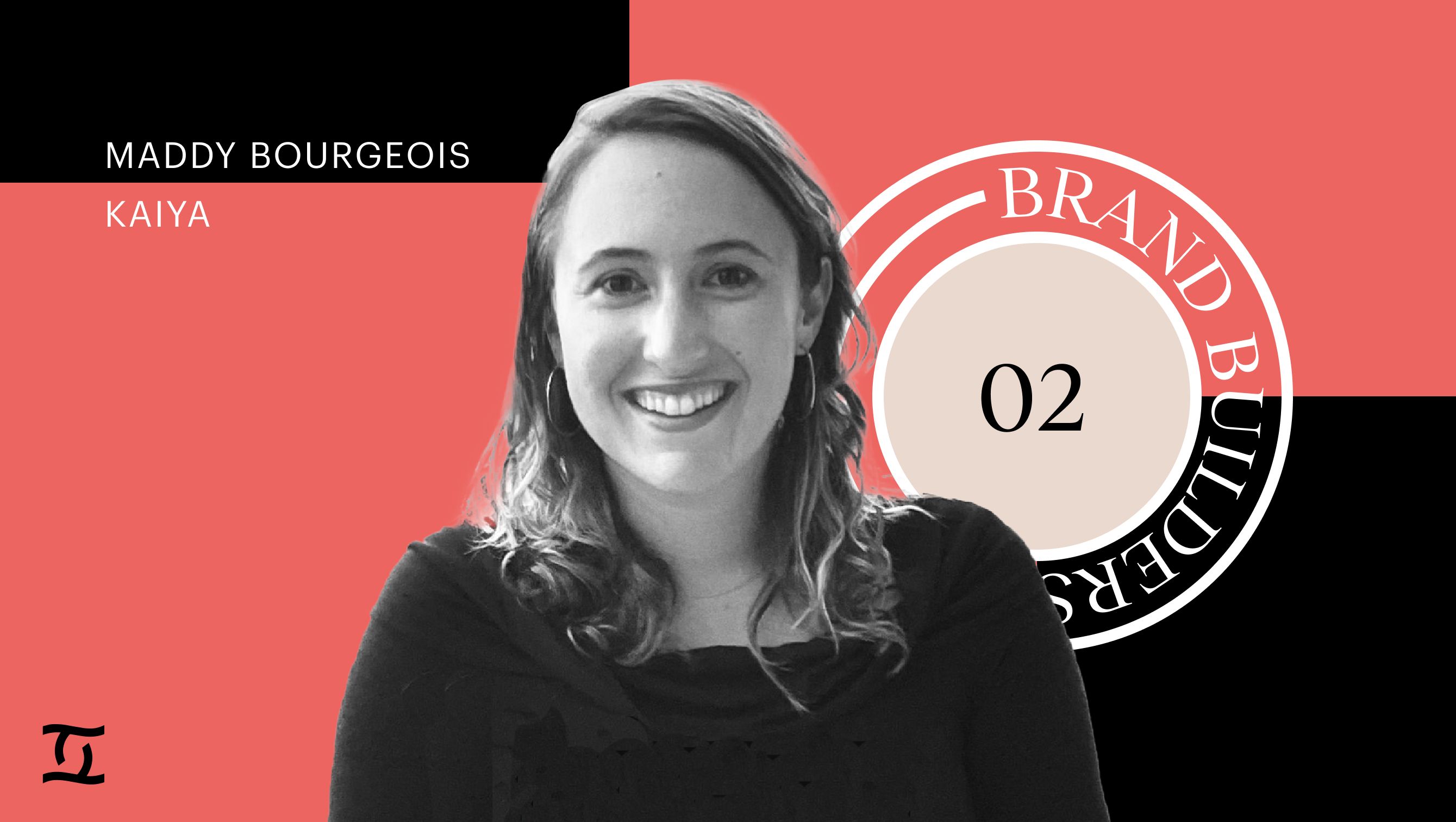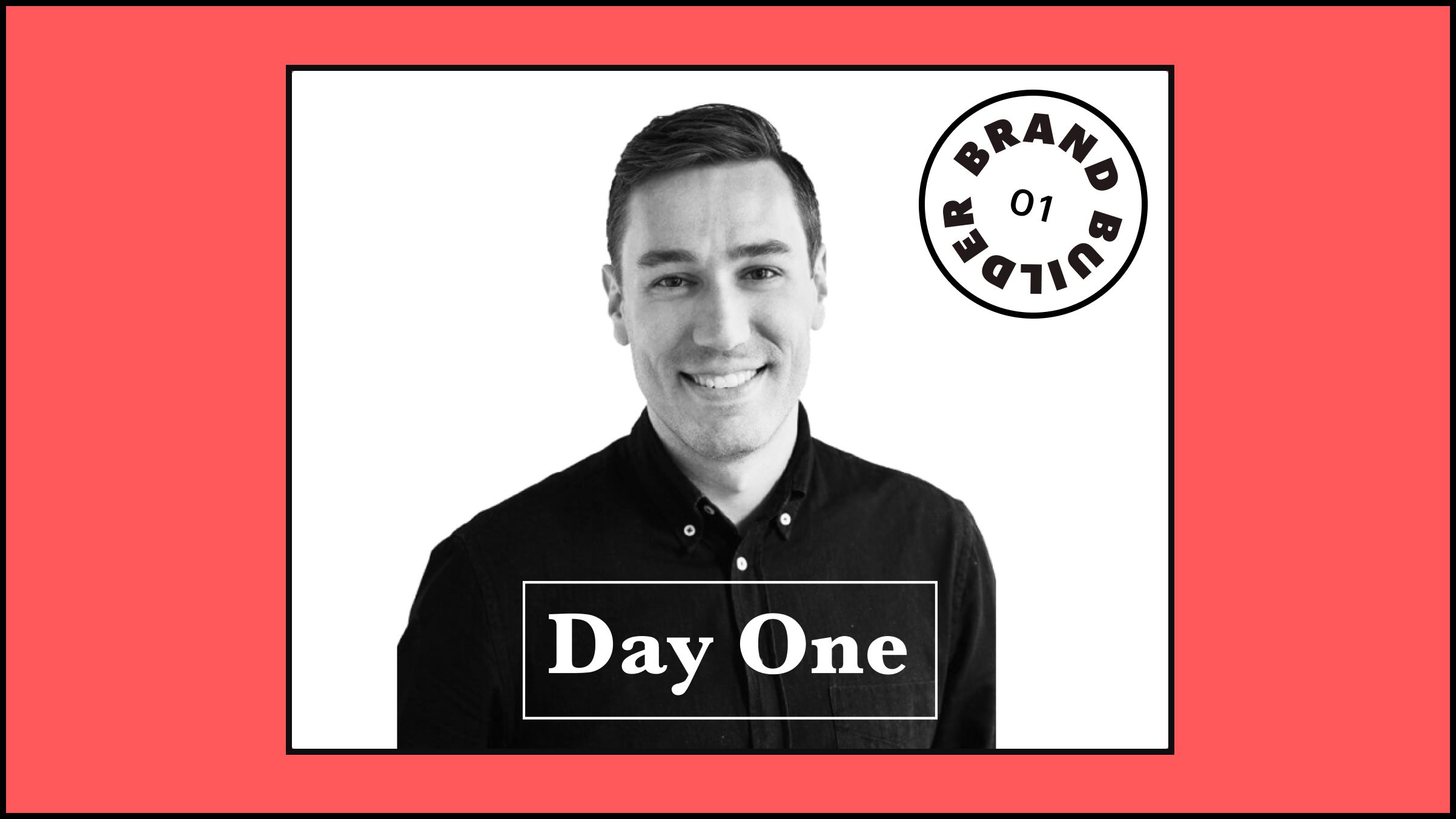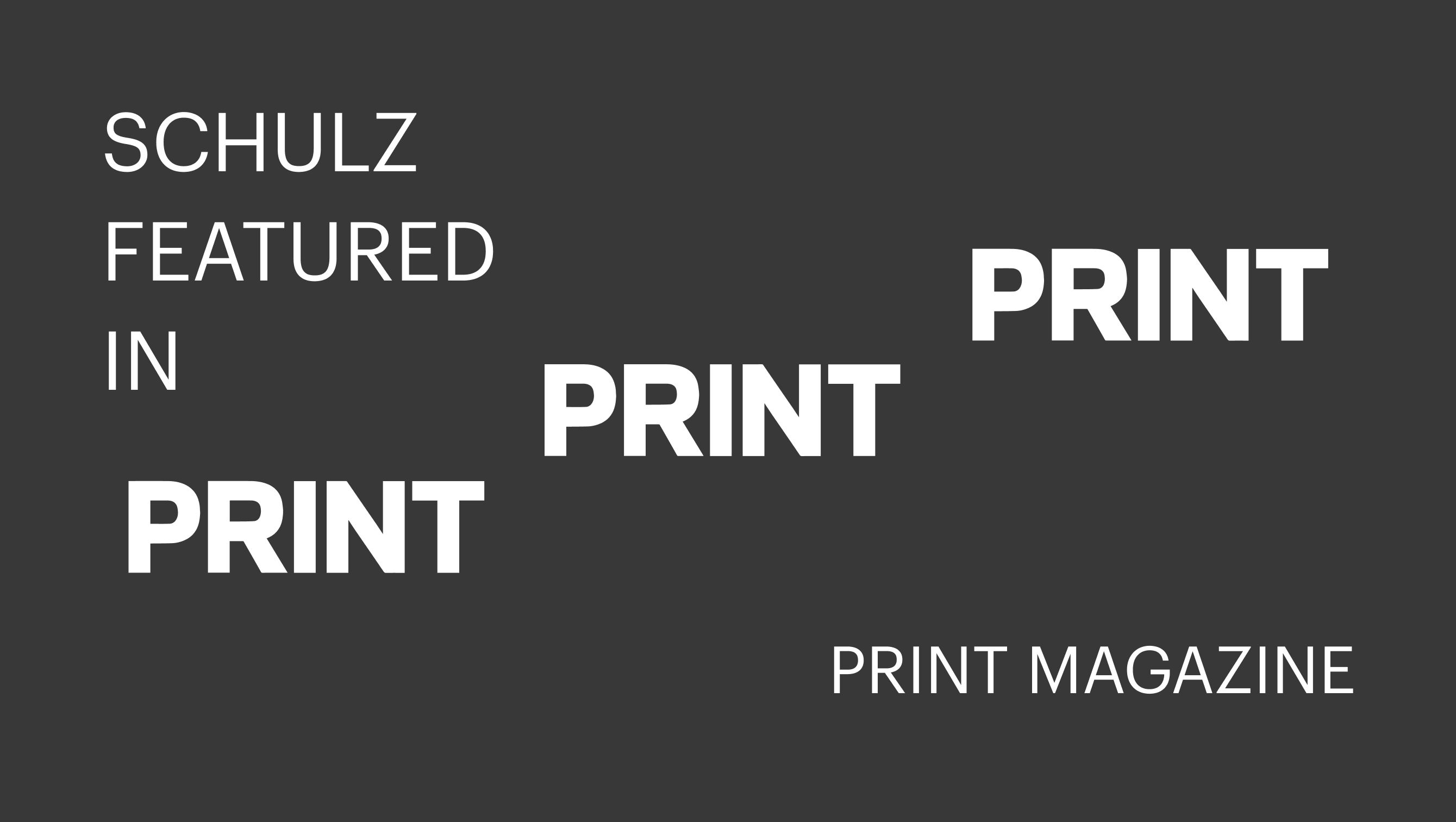
Brand Builders: Maddy Bourgeois, Kaiya
In our conversation series with founders and industry thinkers, we sat down with Maddy Bourgeois, the founder of Kaiya, a new peer mental health resource for Gen-Z that is currently in its incubation phase.
Toronto born and raised, Maddy received a degree in anthropology from Cornell University. After cutting her teeth on strategy, growth, and tech management at Microsoft and early-stage start-ups, Maddy pursued an MBA from the University of Michigan and entered the world of consulting, post-graduation.
In the midst of the pandemic, Maddy was struck by the inability of companies to adequately support their employees' mental health — and she felt invigorated to pursue her venture.
To help her get the business off the ground, she joined Andrew Hutton's Day One program for entrepreneurs and worked alongside our own Adam Chaloeicheep to help shape Kaiya in its early iterations.
Hi Maddy, welcome to Together! Thank you so much for taking the time to speak with us today. First off, tell us a bit about how you started Kaiya.
The premise of Kaiya is to decrease suicide, self harm, anxiety, and depression in preteens and teens by providing social-emotional skills trainings, and mental health leadership training to young people.
When I went into my research process, I didn't want to go in with a solution-first framework. I really wanted to go in with curiosity to understand the problem. But over the last few months, I've started to develop hypotheses about what I think could be a really powerful way to influence and make positive change in the space.
What does it mean to be building from a problem-first approach?
I thank the agency at Accenture for teaching me this and instilling it in me in a formal capacity — the concept around design research means to be curious and acknowledge that the human that is at the center of whatever you're building knows the answer better than you do.
I'm a 30-year-old woman but I was a kid once. I want to acknowledge the world has changed, and that the people who are living it today actually know better what they need and want. The concept is to go in curious and not have too many assumptions and to try to remove your own bias from the exploration.
Coming out of strategy and consulting, what was the impetus for Kaiya? What sparked the idea?
When I was 11, I had my first panic attack. I didn't know what it was, and I had no words to describe what was happening. There was no Google search or YouTube videos I could watch to understand it — I had no tools at my disposal to understand what I was going through.
Through the course of my youth and teens, my anxiety got worse. Ultimately, these panic attacks would be more and more frequent, and they would interfere with my life. For me, that means actually fainting, passing out, stopping breathing, and having a couple moments of really intense scary darkness where it feels like the end of the world. When I started working at Microsoft, I had a pretty bad series of panic attacks that destabilized me. I went to a walk-in clinic to get medication, and they prescribed me an antidepressant at a really high level, and they also gave me a bunch of other prescription drugs and they said, "just take them." I went home that night, and I was extremely out of it. I remember waking up that night with brain zaps, which is a common symptom where your brain literally is just firing.
It was terrifying. At that moment, I thought, "I can't do this anymore." But I was lucky to have family support, and I figured out a rhythm with therapy and with medication at a lower dose and the right ones that helped me get back to where I needed to be.
I share all that because the world has only gotten more complicated — and the world has only gotten more difficult for young people. In the news now more than ever, especially during COVID, I'm reading stories of eight-year-olds committing suicide, calling their moms saying "I love you," and the mother coming home and their kid being gone. It hits me really hard.
When I look at some of the additional influences in young people's lives, like social media, the Internet, and how slow big tech companies around me in Silicon Valley are moving to actually implement and produce new features for these kids, I feel this deep need to do something — to try and intervene with whatever skills and social capital that I have access to today.
Where are you right now with Kaiya? What are you building and envisioning for the future?
When I met other entrepreneurs working in this space, I'd ask them: "Hey, we're building a kid's tele-health company. How did you get access to customer research for these kids?" And they said, "We didn't. We think the parents are the buyers. So we're just going to talk to the parents. It's easier."
It hit me that there's so much bureaucracy in the way of actually talking to young ones, and a lot of these people who are working with these kids aren't actually conducting deep-rooted research. And it's scary to have these open dialogues with kids because you don't know what's going to come up — and you have to be really careful about how you navigate conversations.
But young people, particularly preteen and early teens, feel more alone than ever right now. Even though many of them have accepted that mental health is okay to talk about, there still is a tremendous amount of shame associated with mental health — and admitting that they need help. That helplessness mentality is not something people want to embody. Therefore, it actually prevents these people, even if they're self-aware, from asking for help from their parents, their friends, and their community.
When I asked them, "What can we do? To what extent would you be interested in learning proactive mental health skills to manage these feelings?" They answered that they had low interest.
I realized that they weren't going to help themselves — so I asked "How interested would you be in participating in a program that empowered you with the mental health skills and social-emotional skills to help your friends?" And they were like, "Sign me up, I'm in. I would love to learn how to support my friends, I've got so many friends who are suffering and I want to learn more."
There's this curiosity from Gen Z'ers who go on YouTube who want to self-learn all the time on the internet. But it clicked for me that there's this altruistic need and desire for self-learning — and this desire to be part of a community and to help others. So, if I can frame all of this "broccoli and healthy stuff" that they can do for their brains in this fun way, they're gonna bite and they might actually take the time to do this work, help themselves, and help each other.
Is there a story behind the name, Kaiya?
It was inspired by some of the amazing women I've met in this process that have just blown me away in terms of their ability to advocate and support mental health needs in their community. "Kaiya" means "forgiveness" in Japanese and "ocean and sea" in Hawaiian. It's a name that means a lot to me on a lot of levels — and I'm excited to see where it takes me.
Tell us about your experience with Day One.
Day One was awesome. What I appreciated the most about the experience was that it provided a safe, collaborative community to be vulnerable in my idea. It provided tangible mentorship — people like Adam who volunteered to be part of this weekly mentor meeting cycle. That formal mentorship outlet helped me interact and meet some phenomenal mentors and I can take those relationships beyond Day One.
Is there a piece of advice that you've experienced in your career so far that feels especially applicable and resonant to you?
Now that I'm in the thick of the entrepreneurship journey, I'm realizing that you just have to do it. There's no degree that is going to make growing this business easier. This is all new for me. These are all relatively new problems to be solving. And when you're an entrepreneur, you're tackling a new space. My advice looking back would be to follow your heart and tune into your self-awareness as early as possible. If there are ways for you to follow that passion, and if you're a mission-driven person, I would say do it immediately. Don't wait.
In many ways, I feel like I waited too long to act on my passion and to explicitly pursue a mission-driven career. I was told a lot in my 20s that I just needed to get one more accomplishment or one more credential under my belt. And I think, especially as a woman, there was a lot of pressure I felt to meet these benchmarks of success to prove we're on par with our counterparts.
What's the biggest surprise you've faced over the past year building Kaiya?
I've been surprised by how much people want to help me. In many ways, I feel alone on this journey, because I'm still working day to day on my own. But when I share my vision with others, I have seen an outpouring of support. People have just been opening their arms.
I'm realizing that when you work in an area that is objectively important in the world, there's so much more collaboration and support than anything else I've ever worked on in my life.
The other surprise is that it's hard to put yourself out there. I consider myself a fairly confident and risk-taking person — and it's still scary. And that's such a critical part of entrepreneurship. However a person is able to overcome that fear and that worry, the sooner the better.
How do you see brand and design playing a role in the evolution of Kaiya as it begins to take shape?
I think brand and design are incredibly important in what I want to do. In my observation and research of the space, looking at other sorts of social-emotional skills trainings programs and other suicide prevention programs, the thing that's missing is the brand and the design.
They don't have that stickiness, they don't have that appeal from a Gen Z'er's point of view. And they will continue to be in that box — like "Check this box, do this program," — but it's not going to be something that kids think they can truly rally around in terms of brand, identity, and community.
When I think about building Kaiya, I want to create something that is essentially for Gen Z, by Gen Z. I've had a couple young people helping me work on this from a PR perspective—creating videos, bringing their friends along, and helping create that brand voice and identity. I think that's going to be critical to creating any kind of cool factor in the Gen Z brand.
That's so interesting. Can you speak a bit more about what it's like to built a product for Gen Z?
I look to humans to inform how I build and create. For Gen Z, what I've learned in my research is that it's important to have a brand that they can interact and engage with. I don't want them to just consume learning. Like, how do they share stories? How can they upload content and be part of the narrative? How can I engage them in curriculum co-creation?
I don't think there's any path to success without one of my formal partners being under 21. I want this product to be led by somebody who has lived experience more recently than mine — and I want it to be led by somebody who has experienced mental health with social media and the internet.
My dream is to take some of the existing content and infuse that with personal stories and new content and ideas from these young people. Having a presence online obviously is super important if you want this to be scalable. Creating an identity on Tik Tok and Instagram will be critical in reaching Gen Z where they're at and to get them to be aware of what they could be doing with this program.
How can people support you and Kaiya?
I think I'm going to need a lot of support with everything — the website, the messaging, the social media and marketing. I've never worked professionally in those fields. I think I'm going to need a tremendous amount of support from a medical and clinical lens as well, receiving feedback and support from psychologists and social workers who are living this every single day.
The other piece is just reminding myself to be brave. I think every entrepreneur needs accountability buddies and cheerleaders to keep them motivated throughout this journey because it is lonely. I'm not going into this to make money — I am going into this to help young people.
In the coming months, I'm also trying to figure out: how can other social enterprises inform how I build this business in an authentic, mission-driven, and also innovative and scrappy way? Many entrepreneurs I know that have mission-driven companies started as nonprofits but they had to change later to become for-profits — even if they weren't making much money. They're just low-profit entities that gave them more flexibility in how they could operate.
I would also ask whoever is reading this and whoever is interested in this space to reach out — no matter what your background is. If your passion is in this area, I want to meet you. If you are a parent of preteens or young teens, I want to meet you. And finally, if you're a young person reading this and you want to be involved and help me co-create this program, I want to meet you. I want to work with you and figure out how to incorporate your passion into this program.
Interested in connecting with Maddy about Kaiya? Reach out at maddy@joinkaiya.com.

